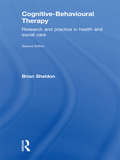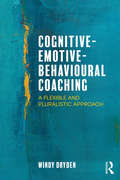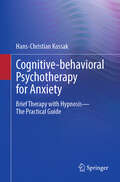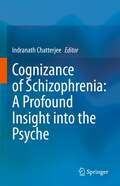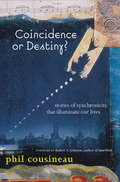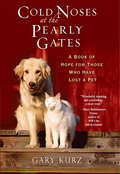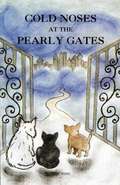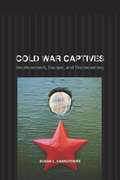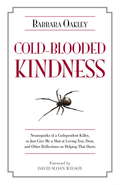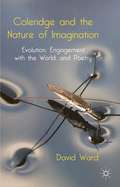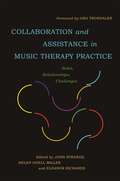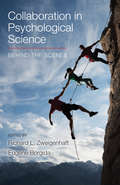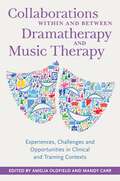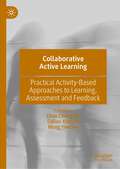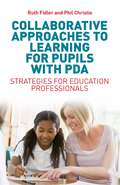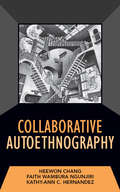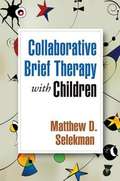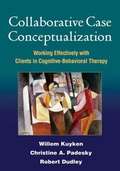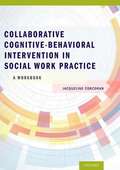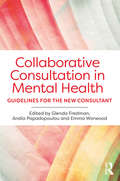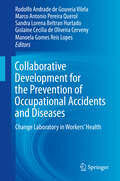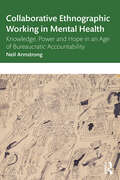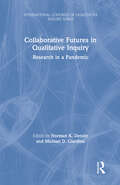- Table View
- List View
Cognitive-Behavioural Therapy: Research and Practice in Health and Social Care
by Brian SheldonCognitive-behavioural therapy (CBT) has been extensively researched and shown to be solidly underpinned by evidence. Broadly applicable across a wide range of personal and social problems – from depression and phobias to child behavioural problems – it is only now beginning to be used to its full potential in health and social care practice. This second edition of Cognitive-Behavioural Therapy is comprehensively revised and updated. It takes into account the significant amount of new research in the discipline, and integrates theory, research and practice. The text includes plentiful case studies from across health and social care to illustrate particular approaches, different problems and different professional circumstances. Topics covered include: a discussion of the development and distinctive features of CBT; a comprehensive review of research on learning and cognition, examining the therapeutic implications of these studies; a thorough guide to assessment and therapeutic procedures, including methods of evaluation; illustrations of the main methods of helping with case examples from social work, nursing and psychotherapy; consideration of the ethical implications of such methods as part of mainstream practice. Cognitive-Behavioural Therapy is written in a lively and accessible style, and is designed to give a thorough grounding in cognitive-behavioural methods and their application. It is essential reading for students and professionals in psychology, social work, psychiatric nursing and psychotherapy.
Cognitive-Emotive-Behavioural Coaching: A Flexible and Pluralistic Approach
by Windy DrydenThis accessible introduction to cognitive-emotive-behavioural coaching (CEBC) emphasises the role emotions play in coaching and explores how coaches can acknowledge them in their work, as well as demonstrating how CEBC can be enriched with a flexible and pluralistic approach. Windy Dryden explores both the range of issues that CEBC can deal with, including practical problems, emotional difficulties and self-development, and outlines the frameworks that coaches need in order to work in each type of CEBC. The book also includes a discussion of the central role of the coaching alliance and is illustrated with three case studies. Written in Dryden’s characteristically clear and straightforward style, this book will be essential reading for coaches of all backgrounds, including those in training, coaching psychologists and coach supervisors.
Cognitive-behavioral Psychotherapy for Anxiety: Brief Therapy with Hypnosis - The Practical Guide
by Hans-Christian KossakIn this practice manual, psychotherapists learn how they can use brief therapy to achieve quick and lasting results for many patients with anxiety. Dr. Kossak combines the two effective methods of hypnosis and cognitive behavioral therapy: it usually works immediately after just one session. The author provides a clearly structured introduction to the underlying theories of the method, which can then be used directly in the extensive practical section. The case studies with study questions make this treatment tangible. The effectiveness is proven by large, sustained catamnesis periods. Written for ... Psychotherapists, doctors, psychiatrists, psychologists, dentists, coaches and students in these subjects. About the author: Dr. Hans-Christian Kossak, Dipl.-Psych., psychological psychotherapist and child and adolescent psychotherapist as behavioral therapist, client-centered psychotherapist, hypnotherapist. Founder of psychotherapy in the combination of cognitive behavioral therapy and hypnosis. Main focus: Anxiety, psychosomatics, learning and performance disorders. He was head of the Catholic Counselling Center for Educational and Family Issues, Bochum; lecturer and trainer of psychotherapists in hypnosis and behavioral therapy; speaker at specialist congresses.
Cognizance of Schizophrenia:: A Profound Insight into the Psyche
by Indranath ChatterjeeThis book provides the reader with a thorough understanding of schizophrenia as a complex brain disorder by explaining the various aspects investigated for its cognizance from epigenetics to chemistry and physics to computational approaches. The book covers the key notions of schizophrenia from a variety of facets such as neurogenetics, neurochemistry, neuropharmacology, neurobiology, psychotherapy, psychiatric treatment, cognitive studies, behavioral and societal studies, and computational neurosciences. Individual chapters are focused on crucial topics such as cognitive-behavioral therapy, brain functioning, computational neuroscience, neuro-imaging, and many more. This book explains each section and chapter with utmost clarity to maintain comprehensiveness for every kind of reader. This book covers various classical as well as recent topics from basic to advance level knowledge regarding schizophrenia. The book's contributions regarding its inclusivity of topics, comprehensiveness of language, diversity in knowledge, and focus on the subject will attract all kinds of readers. It can be considered a single comprehensive handy reference book for beginners, including medical students, neuroscientists, researchers, clinicians, and medical practitioners. Cognizance of Schizophrenia will be an invaluable asset for all who are involved in neuroscience research or clinical studies.
Cohering the Integral We-Space: Engaging Collective Emergence, Wisdom and Healing in Groups
by Olen Gunnlaugson Michael BrabantThis anthology has been designed as a resource for advancing new perspectives, practices and knowledge of the we-space as a group process that brings about distinct forms of individual and social transformation. On the whole, the practices of each we-space lineage engage and co-create our lives from a place of depth and real meeting. This brings forth new insight and collective forms of intelligence that are making new inroads into understanding what it means to come together and participate in the co- creation of our lives, reality and culture. May the emerging wisdom you discover between these pages serve your collective work and practice and benefit others for generations to come.
Coincidence or Destiny?: Stories of Synchoronicity That Illuminate Our Lives
by Phil Cousineau“A delightful reflection of our communal experience of moments that defy rational explanation” from the bestselling author and award-winning filmmaker (NAPRA ReView).The pricking anticipation of a phone call seconds before ringing, the premonition dream of birth exactly nine months before, the chance meeting that opens a new career path, the eerie realization of a loved one’s death half a world away . . . From Jung to Einstein, across boundaries of culture and time, people have recognized the potential for synchronicity to reveal a hidden order to seeming random events, and to offer a glimpse of one’s destiny.In Coincidence or Destiny? bestselling author Phil Cousineau shares more than eighty stories of coincidence, some simple, and some so extraordinary they challenge our belief system. Coincidence or Destiny? threads together what the author calls “sly winks of fate” from ordinary individuals around the world, to well-known scholars such as Larry Dossey and Huston Smith to famous movies such as Casablanca, each story demonstrates how meaningful coincidences can profoundly change and guide people’s lives.“Many things happen to us in life that are fraught with meaning. Amazing coincidences that become turning points in the road. Happenstance events that suddenly become pieces of the puzzle of our lives. Put them together, and you may find an answer to why things are the way they are. [Coincidence or Destiny?] is a wonderful collection of such times.” —Gannett News Service
Cold Noses At The Pearly Gates
by Gary KurzDo all dogs and cats really go to heaven? Yes, they do! The death of your beloved pet can be one of the most heartbreaking losses you'll ever endure. But recovery isn't only about closure. You also want to know where your best friend has gone. After the intense, unexpected grief he experienced following the loss of his own companions, animal lover and biblical scholar Gary Kurz set out to prove that there are indeed pets in Paradise. After devoting countless hours of research, he now shares his inspiring insights to bring you a richer understanding of animals and their souls. You'll finally find answers to common questions about animals and the afterlife--and you'll also get a 30-day devotional to help you work through your grief. If you've ever loved and lost a pet, or if you know someone who has shared a special bond with a furry face and a cold, wet nose, you'll welcome this amazing book's reassurance that love and loyalty are truly eternal, and that someday, you and your pets will be together again.
Cold Noses at the Pearly Gates: A Book of Hope (second edition)
by Gary KurzFrom the book: Employing his Bible education and more than 20,000 hours of personal Bible study, the author thoughtfully and convincingly addresses a question that is often on our minds, but seldom uttered aloud, that of animal afterlife. Organizing his research and thoughts into [an] easy to understand format, he approaches the reader with the heart of one who has personally known loss, seeking to provide comfort and hope. Since being published in 1996, Cold Noses at the Pearly Gates has earned modest fame and recognition via chapters of the Society for the Prevention of Cruelty to Animals, independent animal shelters, radio interviews and Psychiatrists desiring to use portions of the book as part of their grief recovery regimen for their patients. Most importantly to the author however, are the countless letters of appreciation he has received from readers who have been helped through his work. No guide dog user should be without this book. Cold Noses at the Pearly Gates will present the reader with concepts! and ideas they may never have considered before. Some may scoff Others may shrug at their uncertainty. But those who know and love their animals for the wonderful personalities they are will assimilate very well to the logical conclusions drawn by this author.
Cold War Captives: Imprisonment, Escape, and Brainwashing
by Susan L. CarruthersThis book explores the ways in which east-west disputes over prisoners, repatriation, and defection shaped popular culture. Captivity became a way to understand everything from the anomie of suburban housewives to the "slave world" of drug addiction.
Cold War Freud
by Dagmar HerzogIn Cold War Freud Dagmar Herzog uncovers the astonishing array of concepts of human selfhood which circulated across the globe in the aftermath of World War II. Against the backdrop of Nazism and the Holocaust, the sexual revolution, feminism, gay rights, and anticolonial and antiwar activism, she charts the heated battles which raged over Freud's legacy. From the postwar US to Europe and Latin America, she reveals how competing theories of desire, anxiety, aggression, guilt, trauma and pleasure emerged and were then transformed to serve both conservative and subversive ends in a fundamental rethinking of the very nature of the human self and its motivations. Her findings shed new light on psychoanalysis' enduring contribution to the enigma of the relationship between nature and culture, and the ways in which social contexts enter into and shape the innermost recesses of individual psyches.
Cold-Blooded Kindness
by Barbara OakleyAre some people predisposed to kindness to the point of being destructive to themselves and others? How much of our help is fulfilling our own needs--including those of our hidden passions? This is the true story of Carole Alden, a brilliant, yet eccentric mother of five, who evinced a deep and abiding need to help society's outcasts. At her rural homestead an adopted pony mingled with llamas, goats, emus, and dozens of other creatures, familiar and exotic. But Carole's expressed desire to help others extended beyond the animals she took in. It extended beyond her meager resources, even beyond the children she insisted she loved, yet sometimes left neglected in a surreal world of danger. Finally, in the remote reaches of Utah's Great Basin, Carole Alden shot and killed her husband. Dragging his heavy body from the house, she headed for a makeshift grave. Was the murder self-defense? Premeditated? Or was something else altogether at hand? In this searing exploration of deadly codependency, the author takes the reader on a spellbinding voyage of discovery that examines the questions: Are some people naturally too caring? Is caring sometimes a mask for darker motives? Can science help us understand how our concerns for others can hurt everything we hold dear? This gripping story brings extraordinary insight to our deepest questions. Is kindness always the right answer? Is kindness always what it seems?
Coleridge And The Nature Of Imagination
by David WardExamining a range of Coleridge's writings, this book uses recent scientific research to understand how we have evolved to make mental representations of the counterfactual, how such transformative essays in Imagination have enabled humans to survive, to prosper and to express themselves in the sciences, the arts and particularly in poetry.
Collaboration and Assistance in Music Therapy Practice: Roles, Relationships, Challenges
by Helen Odell-Miller Gro Trondalen Tessa Watson Trygve Aasgaard Mary-Clare Fearn Catherine Warner Anthi Agrotou Eleanor Richards Hannah Munro John Strange Jorg Fachner Lyn Weekes Ming-Hung Hsu Motoko Hayata Pornpan Kaenampornpan Rebecca O'Connor Ruth Melhuish Sarah Hadley Tone LeineboRelating the innovative ways in which assistants and collaborators can become an integral part of a course of music therapy, this book explores how the involvement of a diverse range of individuals, such as family members, learning support assistants, caregivers and medical staff, can contribute to successful sessions. Illustrated by clinical examples, the book will help music therapists and students to make the most of opportunities to collaborate with individuals other than the client who may be present during therapy sessions. The book also takes into account the challenges that can arise in music therapy collaboration, and explores the relationships that can develop between music therapists, clients and collaborators.
Collaboration in Psychological Science: Behind the Scenes
by Eugene Borgida Richard ZweigenhaftThis remarkable collection of essays gives students and other researchers a firsthand look at how collaborative scientific research is done. The 21 contributors here are leading psychological and social scientists with extensive experience working as members of a research team. Each author offers a distinctive perspective on the collaborative research process—its pros and cons, challenges and benefits, practical implications and ethical dilemmas. Each essay focuses on a set of guiding questions:What motivated the collaboration?What about the collaboration made the research work more effective (or less?)Does the substantive domain in which the collaboration occurs shape the nature of the collaboration?How have technological advances changed collaboration? Are there particular issues that arise for students collaborating with faculty members, or faculty members collaborating with students?
Collaborations Within and Between Dramatherapy and Music Therapy: Experiences, Challenges and Opportunities in Clinical and Training Contexts
by Susan Greenhalgh Sue Jennings Amelia Oldfield Jo Tomlinson Helen Odell-Miller Grace Thompson Ditty Dokter Eleanor Richards Amanda Carr Rebecca Applin WarnerIn this insightful book, Oldfield and Carr draw together persuasive arguments for combining aspects of music therapy and dramatherapy, whilst retaining their unique facets.Building on the many links between music and drama and the compatibility between the two disciplines, the authors explore how artistic aspects of each therapy can be drawn on to create fresh ways of working. This approach enriches the practice of professionals working to support people with special needs, people recovering from trauma and social deprivation and a wide range of other service users. Despite the significant overlap in music therapy and dramatherapy techniques, this is the first book to directly explore the vast potential of elements of the two disciplines being brought together. Covering a range of different perspectives and practice contexts, this book demonstrates just how much the professions can offer each other both from a clinical perspective and from the point of view of training therapists.
Collaborative Active Learning: Practical Activity-Based Approaches to Learning, Assessment and Feedback
by Meng Yew Tee Gillian Kidman Chan Chang-TikThis book discusses activity-based collaborative active learning (CAL) approaches in connection with the learning and teaching of STEM and non-STEM disciplines. It also covers feedback and assessment activities as learning activities supported by learning technologies and applied in appropriate learning spaces. The contributing authors discuss in detail the implementation and facilitation of activity-based CAL strategies, the problems encountered and corresponding mitigation measures. In addition, all activities are developed in a blended mode, making them suitable for readers at any level of education who are interested in trying out CAL. Covering both STEM and non-STEM disciplines, this book offers comprehensive guidelines for lecturers who are interested in active learning.
Collaborative Approaches to Learning for Pupils with PDA: Strategies for Education Professionals
by Phil Christie Ruth FidlerEducational environments can present challenges for children with Pathological Demand Avoidance (PDA), who require different strategies than children with a more straightforward presentation of autism, and schools frequently find themselves struggling to meet their complex needs. In this guide PDA experts Ruth Fidler and Phil Christie outline effective strategies for supporting pupils with PDA in education settings.Including a useful overview of PDA, this book outlines the impact of this diagnostic profile on learning, and explains why Collaborative Approaches to Learning is such a successful method for supporting pupils with PDA. It shows how teaching professionals can get started with this approach, with advice for implementing key strategies to overcome common challenges. The book also includes information on creating PDA-friendly learning environments, helping pupils to develop long-term social and emotional resilience. With handy downloadable resources, valuable information on supporting the wellbeing of adults who work with children with PDA, this is an essential resource for teaching and support staff in mainstream and special education schools.
Collaborative Autoethnography (Developing Qualitative Inquiry #8)
by Heewon Chang Faith Ngunjiri Kathy-Ann C HernandezIt sounds like a paradox: How do you engage in autoethnography collaboratively? Heewon Chang, Faith Ngunjiri, and Kathy-Ann Hernandez break new ground on this blossoming new array of research models, collectively labeled Collaborative Autoethnography. Their book serves as a practical guide by providing you with a variety of data collection, analytic, and writing techniques to conduct collaborative projects. It also answers your questions about the bigger picture: What advantages does a collaborative approach offer to autoethnography? What are some of the methodological, ethical, and interpersonal challenges you’ll encounter along the way? Model collaborative autoethnographies and writing prompts are included in the appendixes. This exceptional, in-depth resource will help you explore this exciting new frontier in qualitative methods.
Collaborative Brief Therapy with Children
by Eliana Gil Matthew SelekmanIn this engaging guide, Matthew Selekman presents cutting-edge strategies for helping children and their families overcome a wide range of emotional and behavioral challenges. Vivid case material illustrates how to engage clients rapidly and implement interventions that elicit their strengths. Integrating concepts and tools from a variety of therapeutic traditions, Selekman describes creative applications of interviewing, family art and play, postmodern and narrative techniques, and positive psychology. He highlights ways to promote spontaneity, fun, and new possibilities especially with clients who feel stuck in longstanding difficulties and entrenched patterns of interaction. The book updates and refines the approach originally presented in Selekman's acclaimed Solution-Focused Therapy with Children.
Collaborative Case Conceptualization
by Christine Padesky Willem KuykenPresenting an innovative framework for tailoring cognitive-behavioral interventions to each client's needs, this accessible book is packed with practical pointers and sample dialogues. Step by step, the authors show how to collaborate with clients to develop and test conceptualizations that illuminate personal strengths as well as problems, and that deepen in explanatory power as treatment progresses. An extended case illustration demonstrates the three-stage conceptualization process over the entire course of therapy with a multiproblem client. The approach emphasizes building resilience and coping while decreasing psychological distress. Special features include self-assessment checklists and learning exercises to help therapists build their conceptualization skills.
Collaborative Cognitive-Behavioral Intervention in Social Work Practice: A Workbook
by Jacqueline CorcoranCollaborative Cognitive-Behavioral Social Work Intervention: A Workbook presents knowledge about behavioral and cognitive interventions in an easy-to-read manner. Cognitive-behavioral therapy (CBT) can be an empowering approach to change, helping clients at the individual level learn how to take change painful feelings and harmful behaviors and manage their social environment by learning new skills. An abundance of examples allows the reader to see the diverse range of applications cognitive-behavioral interventions might have to social work, as well as how to deliver CBT in a way that is respectful of client circumstances and works with people collaboratively.
Collaborative Consultation in Mental Health: Guidelines for the New Consultant
by Glenda Fredman Andia Papadopoulou Emma WorwoodCollaborative Consultation in Mental Health: Guidelines for the New Consultant offers a practical guide for professionals working ‘indirectly’ with clients through consultation with staff. As resources become more scarce in public services and a greater number of people seek mental health interventions, professionals are increasingly called upon to consult with practitioners who conduct face-to-face work with clients. This book provides an essential guide for those who are interested in developing their consultation competence. This book introduces the reader to the principles of a collaborative approach to consultation with practitioners, teams and agencies working in health, education, social care and mental health. The book takes the reader step-by-step through the collaborative consultation process, from preparing and setting up the context for consultation through to communicating effectively to build cooperative partnerships, and evaluating consultation outcomes. Collaborative Consultation in Mental Health guides the consultant in how to apply and develop these principles and practices within group consultation and also addresses common dilemmas and challenges consultants encounter. Collaborative Consultation in Mental Health will appeal to both new and experienced consultants working with adults, children, older people, people with intellectual disabilities and families across a range of contexts.
Collaborative Development for the Prevention of Occupational Accidents and Diseases: Change Laboratory in Workers' Health
by Rodolfo Andrade de Gouveia Vilela Marco Antonio Pereira Querol Sandra Lorena Beltran Hurtado Gislaine Cecília de Oliveira Cerveny Manoela Gomes Reis LopesThis book presents an innovative method to improve workers’ health and prevent occupational accidents: the Change Laboratory, a method of formative intervention that enables the organization's participants to identify, with the help of facilitators, the historical and systemic origins of work processes anomalies (environmental problems, work safety and health, quality and productivity problems, problems related to labor relations, etc). It proposes a cycle of expansive learning that evolves from recognition of the problem to the visualization, testing and consolidation of solutions.The Change Laboratory method was first developed by Finnish researchers in the 90s and has been improved since then by an international network of research centers in ten countries. This volume presents the results of the experiences conducted by the Brazilian research group to apply the methodology to workers’ health programs. It adopts a translational approach and seeks to elaborate a method of intervention that goes beyond the mere diagnostics to present solutions to concrete problems based on systematized and participatory research. Collaborative Development for the Prevention of Occupational Accidents and Diseases - Change Laboratory in Worker's Health will be of interest to both researchers and professionals engaged in developing intervention programs to improve safety and health at work, such as occupational health professionals and researchers, organizational psychologists, safety engineers and public agents working with workers’ health regulations. The book will also be of interest to occupational health students interested in learning how the Change Laboratory method can be applied to this field of research and activity.
Collaborative Ethnographic Working in Mental Health: Knowledge, Power and Hope in an Age of Bureaucratic Accountability
by Neil ArmstrongCollaborative Ethnographic Working in Mental Health seeks to chart a new direction for research into mental healthcare, with the aim of creating the conditions for more productive interdisciplinary dialogue. People involved in mental health often fail to recognise how they are described by researchers from the humanities and social sciences, which inhibits productive collaboration. This book seeks to address this problem, by including clinicians and patients in the research process and by shifting attention away from power and knowledge and towards the organisational context. It explores how clinical thinking and behaviour, illness experience, and clinical relationships are all shaped by the bureaucratic context. In particular, it examines tensions between what we want from mental healthcare and how accountable bureaucracies actually work, and proposes that mental healthcare research should not just evaluate new interventions but should investigate new ways of organising. This book is written with a non-specialist audience in mind, as it is intended for all with a stake in mental healthcare research and practice. It is also for those with an interest in ethnographic methods, as a novel way of deploying ethnography, autoethnography and coproduced ethnography to address clinically important research topics.
Collaborative Futures in Qualitative Inquiry: Research in a Pandemic (International Congress of Qualitative Inquiry Series)
by Norman K. Denzin Michael D. GiardinaCollaborative Futures in Qualitative Inquiry critically reflects on and explores the role of qualitative research amidst the global COVID-19 pandemic. Against this unprecedented backdrop, it asks what research means during a global pandemic and what it means to be an academic. Leading international scholars from the United States, Canada, Chile, New Zealand, Norway, and the United Kingdom wrestle with the changing dynamics of research in pandemic times. Collectively and collaboratively, contributors call for a critical, performative, social justice inquiry directed at the multiple crises of our historical present—a rethinking of where we have been, and, critically, where we are going. More specifically, contributors focus on such topics as: the emotional geographies of academic writing; assaults on science and truth; pedagogies of the imagination; indigenization and reconciliation; the search for our common humanity; and the relevance of qualitative inquiry in an era of big data and digital transformation. Collaborative Futures in Qualitative Inquiry is a must-read for faculty and students alike who are interested in imagining new ways to collaborate, to engage in research and activism, and represent and intervene into social life in pandemic times.
